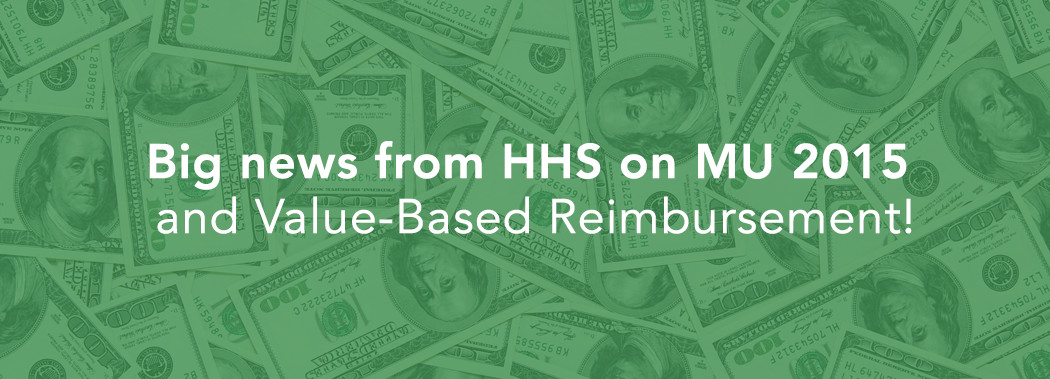Recently, Health and Human Services (HHS) announced coming changes to Meaningful Use (MU) reporting in 2015 and aggressive goals to shift from fee-for-service to value-based payment.
Get the information you need to navigate the ever-changing Health Reform environment. Each month the NextGen Healthcare Government & Industry Affairs team will address what’s happening in Health Reform in our “Health Reform Simplified” webinar; Register today for future webinars. Log in to the Knowledge Exchange and click here to register for March and April webinars. Read on to learn more about the latest news from HHS.
HHS Announces MU 2015 Changes
CMS Announces Intent to Reduce 2015 MU reporting period to 90 days and other MU changes
The Centers for Medicare & Medicaid Services (CMS) announced its intent to change key elements of its EHR Incentive Programs. The changes are intended to help reduce the reporting burden on providers, while supporting the long term goals of the program.
Chief among CMS proposed changes to its EHR Incentive Program this year is the elimination of full-year MU reporting. The proposed change is to allow a 90-day MU reporting period in 2015 for all providers. (CMS previously modified the rule to allow a 90-day reporting period for all providers in 2014.)
Also under consideration: alignment of the eligible hospital reporting period with the calendar year (per the rule for eligible professional); and “modifying other aspects of the programs to match long-term goals, reduce complexity, and lessen providers’ reporting burden.”
The changes are a response to concerns from myriad stakeholders about software implementation, information exchange readiness, and other related concerns about the program this calendar year. The announcement to pursue changes in 2015 to the EHR Incentive Program is separate from the forthcoming Stage 3 proposed rule, which is expected to be released by early March.
What it means for NextGen Healthcare clients: If the 90-day, 2015 MU reporting rule becomes final as expected, clients who did not previously upgrade to NextGen® Ambulatory EHR version 5.8 and fully implement required ancillary solutions, now have an additional opportunity to attest to MU in 2015, earn incentives, and avoid future penalties. Clients should upgrade as soon as possible and prepare to meet MU. Clients who already have upgraded to version 5.8 should continue adopting the required MU workflows to meet MU in 2015. While this may help some NextGen Healthcare clients to stay on track with MU, it is not a signal that clients can further delay critical software updates to NextGen Ambulatory 5.8 and NextGen® Knowledge Base Model (NextGen KBM) 8.3.
NextGen Healthcare will closely monitor the rulemaking process for this and other proposed modifications and the impact on clients. In the meantime…
Focus on full implementation of the 2014 Edition (NextGen Ambulatory EHR version 5.8 and required ancillary solutions) and on the current objectives of the MU Stage you’re currently working.
Also, don’t lose sight of the October 1, 2015 transition deadline for ICD-10, which will require clients to be on EHR version 5.8 and NextGen KBM version 8.3. You should coordinate your upgrades and MU reporting if at all possible to avoid overlap with this critical milestone!
HHS makes it official: Value-based Reimbursement is coming
On January 26, Health and Human Services (HHS) Secretary Sylvia M. Burwell announced measurable goals and a timeline to move the Medicare program toward paying providers based on quality. The announcement and its details can be found here. In it, HHS sets a goal of moving 30 percent of Medicare payments into alternative, value-based payment models by the end of 2016 and plans to increase that to 50 percent by the end of 2018.
What it means for NextGen Healthcare clients: While this transition to a value-based payment model will not happen overnight, this is the first time in the history of the Medicare program that HHS has identified specific goals and payment models for value and reported quality of care. As in the past, private payers are following suit. NextGen Healthcare has been working hard on new solutions to support clients participating in current value-based models, while following and contributing to policy discussions likely to shape future requirements. Continuous education on these proposed and emerging payment reform models is vital. How will your practice transformation strategy align with value-based healthcare? Look for updates and tools from NextGen Healthcare to help you in this transition.
Next “Health Reform Simplified” Webinar
Stay connected to your NextGen Healthcare Government & Industry Affairs team. Remember, get the information you need to navigate the ever-changing Health Reform environment. Each month the NextGen Healthcare Government & Industry Affairs team will address what’s happening in Health Reform in our “Health Reform Simplified” webinar; Register today for future webinars. Log in to the Knowledge Exchange and click here to register for March and April webinars.

